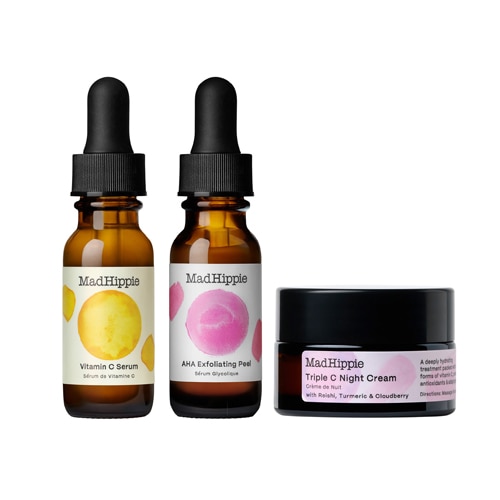[vc_row][vc_column][vc_column_text]As you get older, or if you spend a lot of time in the sun, you might start to notice small dark spots or patches on your skin. Are they moles? Freckles? Pimples? Enlarged pores? There are so many different skin conditions that resemble one another, so it can be hard to really know what’s exactly going on with without talking to a dermatologist. (Note: If you’re concerned about a dark spot or other mysterious skin growth, definitely book an appointment with a professional!)

If you’re experiencing hyperpigmentation, which is the official term for the formation of skin patches that are darker than your natural skin tone, it may not be cause for concern. Dark spots don’t cause skin cancer. But if they appear, it may mean that you need to reduce sun exposure, apply
sunscreen more often or switch to a higher SPF sunscreen product to better protect your skin. Dark patches do worsen with sun exposure, so unless you take action to better protect your skin, dark spots will get even darker over time.
What causes hyperpigmentation?
Without question, the biggest cause of hyperpigmentation is sun exposure.
“The natural pigment melanin, which gives skin its color, is produced more quickly by ultraviolet (UV) radiation, and dark spots develop when melanin accumulates or is created in significant quantities on skin that has been exposed to the sun for a long time,” explains
Dr. Anna H. Chacon, a Miami-based board-certified dermatologist.
Hyperpigmentation can occur at any age and affect people of all ethnicities, but it’s most commonly experienced over age 40. People with darker skin tones may produce more melanin naturally, which can put them at greater risk of developing dark spots over time. Color and darkness can vary based on skin tone, meaning dark spots can range in shade, and from light brown to dark brown.
“The areas are painless and have the same texture as the surrounding skin,” Chacon continues. “Dark spots can also appear on any part of the body and come in a variety of sizes, although they are most prevalent in locations that are frequently exposed to the sun.”
Note that hyperpigmentation may also result from use of tanning lamps and beds. According to
Cleveland Clinic, other reasons hyperpigmentation may occur include hormonal changes, skin injuries (such as acne, cuts or burns), medications (such as birth control pills or drugs that increase sensitivity to light), diseases and disorders (such as Addison’s disease) and genetics (think: your family has freckled skin).
How to treat hyperpigmentation
The
best way to treat dark spots is topically, with a skincare regimen that features the right combination of skin-active agents and properties to lighten and balance skin tone and complexion.
“It’s best to use a
product with dark spot correcting ingredients, including azelaic acid, glycolic acid, kojic acid, retinoids (adapalene gel, tazarotene, retinol and tretinoin) and vitamin C,” Chacon says.
Key nutrients to fight dark spots:
Alpha hydroxy acids (AHA): Research shows that the use of AHAs (including glycolic acid) is beneficial for
improving hyperpigmentation, while additionally providing other skin benefits. “AHAs are produced by plants and are made up of small molecules that skin can easily absorb, notes Chacon. “They’re also good for reducing wrinkles, enhancing skin texture and providing other anti-aging benefits.”
Niacinamide: Niacinamide is a form of vitamin B3 that’s essential for skin health. It’s a popular ingredient in
dark spot treatment serums and often combined with moisturizing agents, such as hyaluronic acid and vitamin E to promote hydration.
Vitamin C: Well known for its
benefits for hyperpigmentation, vitamin C works at a cellular level to inhibit melanin synthesis. Many
brightening skincare products feature vitamin C in combination with other nutrients such as vitamin A and azelaic acid (also known to
help with hyperpigmentation).
Beta hydroxyl acids (BHA): Traditionally used to treat acne, BHAs (including salicylic acid) also
help with dark spots, as they’ve been found to have anti-inflammatory and whitening effects on skin. Chacon notes that BHAs are often combined with niacinamide, which also offers benefits for acne. Her advice for those suffering from acne and dark spots is to choose a
daily face serum or
exfoliating cleanser containing both ingredients for clear, bright skin.
Retinols: Derived from vitamin A, retinols are potent natural substances that “can improve skin tone and texture, reduce fine wrinkles, reverse sun damage and reverse the effects of aging,” says Chacon. Retinol has been
shown to improve hyperpigmentation. Because it’s a strong ingredient, it’s generally advised to start slow with application and research
how to use retinol before adding it to your skincare routine.
Treating hyperpigmentation: Consistency is key
In general, it’s important to be consistent with your skincare routine; but if your goal is to treat hyperpigmentation, it really matters. You’ll see results faster if you follow through with a daily regimen and do not skip any days of treatment.
Hyperpigmentation should start to diminish after a month of treatment. More noticeable benefits can take up to three months. Note that it may take longer to see results if you struggle with acne or severe dark spots.
For most people, though, consistency and high-quality skincare products will lead to clearer, brighter, smoother and more dewy skin after about four weeks.
“Increased
collagen production may contribute to these benefits,” Chacon adds, as ingredients treating dark spots also provide anti-aging and other benefits.
Finally, Chacon notes that some ingredients, such as vitamin C, AHAs and BHAs, are faster-acting than others, such as retinol. Retinol’s benefits for dark spots and anti-aging can take three to six months to see.
†These statements have not been approved by the Food and Drug Administration. These products are not intended to diagnose, treat, cure or prevent disease.[/vc_column_text][/vc_column][/vc_row][vc_row][vc_column][vc_text_separator title="Featured Products" border_width="2"][vc_row_inner equal_height="yes" content_placement="middle" gap="35"][vc_column_inner width="1/3"][vc_single_image image="168209" img_size="full" alignment="center" onclick="custom_link" img_link_target="_blank" css=".vc_custom_1691422305005{padding-right: 7% !important;padding-left: 7% !important;}" link="https://www.vitacost.com/truskin-retinol-moisturizer"][/vc_column_inner][vc_column_inner width="1/3"][vc_single_image image="168210" img_size="full" alignment="center" onclick="custom_link" img_link_target="_blank" css=".vc_custom_1691422324379{padding-right: 7% !important;padding-left: 7% !important;}" link="https://www.vitacost.com/andalou-naturals-brightening-glycolic-mask-brightening-pumpkin-honey"][/vc_column_inner][vc_column_inner width="1/3"][vc_single_image image="168211" img_size="full" alignment="center" onclick="custom_link" img_link_target="_blank" css=".vc_custom_1691422342822{padding-right: 7% !important;padding-left: 7% !important;}" link="https://www.vitacost.com/acure-brightening-day-cream"][/vc_column_inner][/vc_row_inner][/vc_column][/vc_row]
 If you’re experiencing hyperpigmentation, which is the official term for the formation of skin patches that are darker than your natural skin tone, it may not be cause for concern. Dark spots don’t cause skin cancer. But if they appear, it may mean that you need to reduce sun exposure, apply sunscreen more often or switch to a higher SPF sunscreen product to better protect your skin. Dark patches do worsen with sun exposure, so unless you take action to better protect your skin, dark spots will get even darker over time.
If you’re experiencing hyperpigmentation, which is the official term for the formation of skin patches that are darker than your natural skin tone, it may not be cause for concern. Dark spots don’t cause skin cancer. But if they appear, it may mean that you need to reduce sun exposure, apply sunscreen more often or switch to a higher SPF sunscreen product to better protect your skin. Dark patches do worsen with sun exposure, so unless you take action to better protect your skin, dark spots will get even darker over time.



